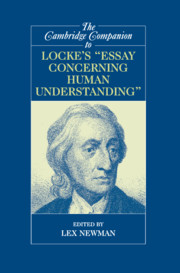Book contents
- Frontmatter
- Introduction
- 1 The Intellectual Setting and Aims of the Essay
- 2 Locke’s Polemic against Nativism
- 3 The Taxonomy of Ideas in Locke’s Essay
- 4 Locke’s Distinctions between Primary and Secondary Qualities
- 5 Power in Locke’s Essay
- 6 Locke on Substance
- 7 Locke on Ideas of Identity and Diversity
- 8 Locke on Ideas and Representation
- 9 Locke on Essences and Classification
- 10 Language, Meaning, and Mind in Locke’s Essay
- 11 Locke on Knowledge
- 12 Locke’s Ontology
- 13 The Moral Epistemology of Locke’s Essay
- 14 Locke on Judgment
- 15 Locke on Faith and Reason
- Bibliography
- Index of Names and Subjects
- Index of Passages Cited
13 - The Moral Epistemology of Locke’s Essay
Published online by Cambridge University Press: 28 July 2007
- Frontmatter
- Introduction
- 1 The Intellectual Setting and Aims of the Essay
- 2 Locke’s Polemic against Nativism
- 3 The Taxonomy of Ideas in Locke’s Essay
- 4 Locke’s Distinctions between Primary and Secondary Qualities
- 5 Power in Locke’s Essay
- 6 Locke on Substance
- 7 Locke on Ideas of Identity and Diversity
- 8 Locke on Ideas and Representation
- 9 Locke on Essences and Classification
- 10 Language, Meaning, and Mind in Locke’s Essay
- 11 Locke on Knowledge
- 12 Locke’s Ontology
- 13 The Moral Epistemology of Locke’s Essay
- 14 Locke on Judgment
- 15 Locke on Faith and Reason
- Bibliography
- Index of Names and Subjects
- Index of Passages Cited
Summary
Locke's general moral theory presents formidable difficulties for the commentator. Depending on where in the Essay one looks, the content of morality appears to depend on the Bible, or on the requisites of our fellows, or on our personal needs and interests. Our knowledge of moral principles seems in turn to depend on a priori reflection, social learning, religious instruction, and the analysis of terms and sentences. Locke's generous attempt to accommodate every moral intuition makes it difficult to characterize his doctrines in standard terms. Is Locke a conventionalist who anticipates Hume, or a realist who believes firmly in moral truth? Is he a divine command theorist who looks to the Word of God, or a naturalist who looks to the Law of Nature for moral orientation? Why does he insist that moral reasoning is comparable to mathematical reasoning while at the same time presenting the history of ethics in an unmathematical way as a history of insoluble squabbles between moral sects?
Yet this Easter basket of thoughts and doctrines is not the chaos it seems. To bring some order into it, it is useful to remember that Locke was the first philosopher to give sustained attention to moral epistemology, to treat moral practices as reflecting the acquired concepts and beliefs of practitioners. Although Descartes describes morality as presenting a problem of theory choice, pointing to the difference between a provisional morality to be used whilst undertaking one’s inquiries and a perfected, scientific morality that will cap them off, no philosopher before Locke compares and contrasts our ability to discover facts about the natural world with our ability to discover the truths of morality, considering both from an epistemological standpoint.
- Type
- Chapter
- Information
- Publisher: Cambridge University PressPrint publication year: 2007
- 6
- Cited by



